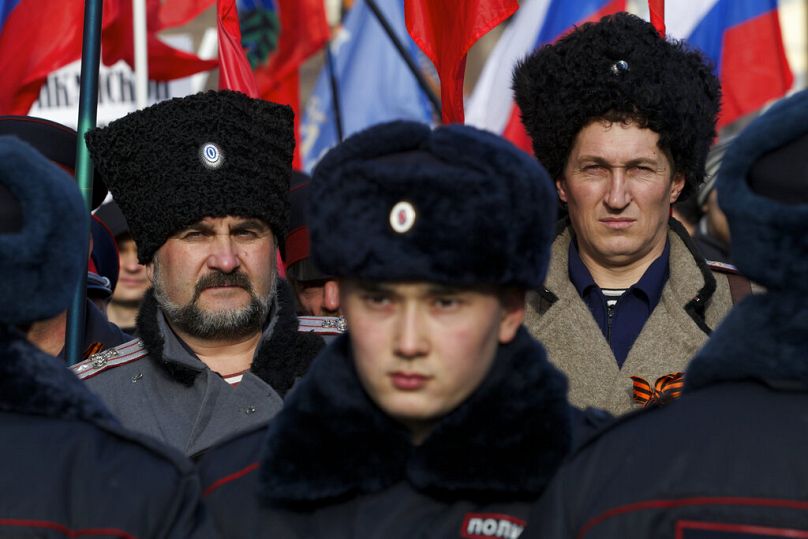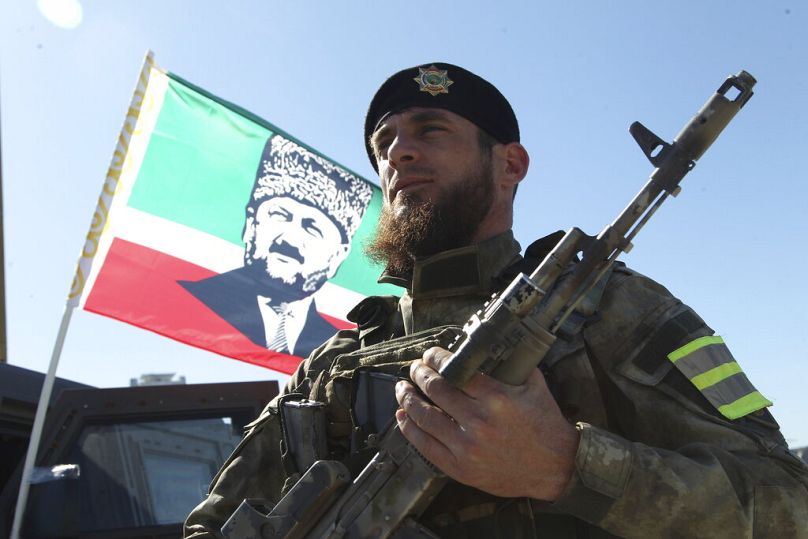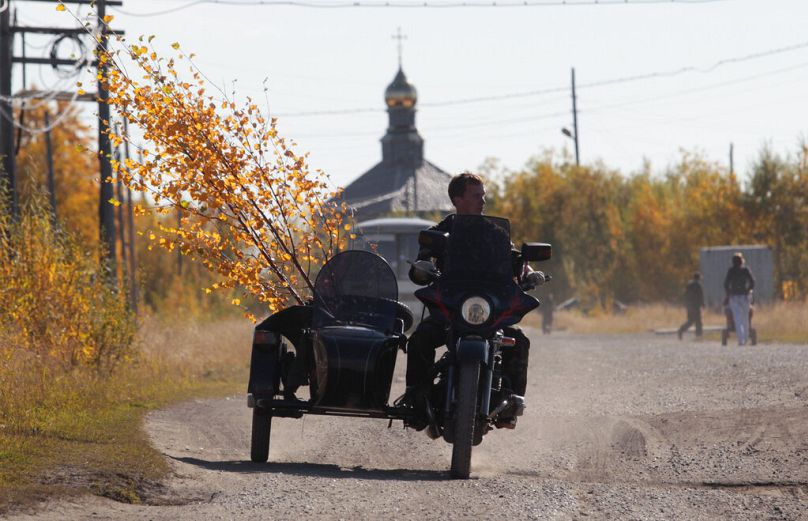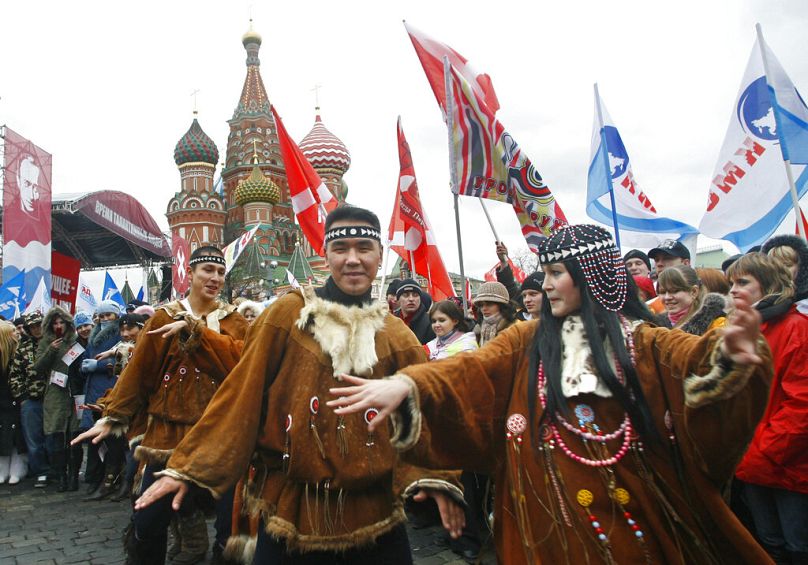In today's Russia, Putin’s policies — obscured by quotes of one nation "united by a common destiny" — are feudal and assimilationist, Aleksandar Đokić writes.
"We, the multinational people of the Russian Federation, united by a common destiny on our land" — this is the first line of the Boris Yeltsin-era Constitution of the Russian Federation.
Those are the same words Vladimir Putin used to begin his speech at the Luzhniki Stadium on 18 March 2022, shortly after launching the full-scale invasion of Ukraine.
In today's Russia, like in all other autocracies, laws cannot be placed above the will of the dictator. Quoting the country's founding documents — just like Putin did — boils down to a charade.
Most often these laws are mere fronts, behind which the repressive machinery clumsily hides. After all, Joseph Stalin’s 1936 Constitution formally guaranteed the disenfranchised Soviet nations universal rights “irrespective of their nationality or race, in all spheres of economic, state, cultural, social, and political life”.
Yet, millions of Soviet citizens ended up either being imprisoned in horrendous Gulag labour camps or forcefully displaced from their homes with low odds of survival. In their case, this was done truly irrespective of their nationality or race.
Falling for the spiel is easy
However, the opening quote about the “multinational people” does in fact represent an actual political concept present in contemporary Russia.
This policy, a mix of two contradictory concepts, represents the eclectic nature of Putin’s domain: it's a simplified variation of the USSR's civilisation-building project, which strived to construct a new Soviet — an identity superior to traditional ethnoreligious collective ones, contrasting the Russian imperial idea of separate communities.
The Soviet concept represented a break with the policies of the Russian Empire, in which ethnic and religious differences also meant various levels of political and economic rights.
That didn't stop the Soviet system from persecuting and differentiating between its citizens using ethnic and cultural profiling — as seen in the forced displacement of the North Caucasus nations to Central Asia in 1944, or the purges of influential scientists of Jewish descent after World War II.
Another good example of seemingly altruistic policies towards minorities can be observed in the Soviet state granting people of Jewish descent the right to emigrate should they wish so back in the 1970s.
This was done to quietly and systematically facilitate their exodus from the USSR while presenting the Soviet leadership as more democratic than it is to those in the West.
And some took the bait. A number of Western observers saw this policy as a sort of liberalisation, while antisemitism — which was also a factor — flew under the radar.
The same goes for the “multinational people” concept we see today. Given how about 20% of the country's population is of non-Russian ethnicity, some laud it as a multicultural paradigm, emphasising its idealistic promise to include all nations comprising Russia into its society as equals.
That might as well have been the intention of the authors of the Russian Constitution in the 1990s. But in today's reality, Putin’s policies obscured by quotes of those ideals are feudal and assimilationist.
What Putin boasts about is not respect for others — it's feudal policies
“The desecration of the Holy Qur’an is a crime and will be penalised in Russia”, Putin said on 29 June during his visit to the Republic of Dagestan, one of the Muslim-majority regions of Russia.
This statement was a part of the information war to prevent Sweden — which was struggling to deal with its Qur'an-burning far-right extremists — from becoming a part of NATO.
But it also has a long-term goal: to demonstrate to the global Muslim population that Putin respects their religious beliefs more than Western democratic systems who also have to contend with their pesky freedom of expression.
The reality in Russia bites a little differently, though. Putin is intentionally creating isolated non-Russian communities, wherever the ethnoreligious structure allows it, in order to obtain the loyalty of the regional elites.
Nowhere is this practice more acute and noticeable than in Ramzan Kadyrov’s Chechnya, where not only political dissenters are persecuted, but ordinary people trying to escape the everyday brutality of patriarchal relations.
The most recent such case is that of Selima Ismailova, a young girl who attempted to flee Russia from her abusive family in June this year. She was stopped at Moscow’s Vnukovo airport and turned over to the Chechen police, no questions asked.
Other reports of Chechen authorities acting without a warrant or approval of local courts — a practice unheard of for law enforcement from other parts of Russia — have shown this was now systemic practice and not an isolated case.
In effect, Putin has basically facilitated the creation of an Iranian- or Saudi-style moral police inside Russia.
This example — unfortunately, only one of many — shows that what Putin boasts about is not multiculturalism: these are feudal policies, in which there is one set of laws in ethnically Russian regions and a different one in non-Russian-majority ones.
This kind of practice represents a return to the Russian imperial model — a regression even when compared to the Soviet times.
It's okay to be autochthonous, as long as it's in Russian
While ethnically non-Russian regions have the nominal right to preserve their autochthonous culture, in reality, Russian culture and the Russian language are intensely propagated instead.
It is very important to make a distinction here between immigrant and autochthonous communities since Russia is not only a focal point for Central Asian migrants but also occupies many colonised territories of those nations which were, over the centuries, conquered and subsumed into Russia.
Many of these native regions have been intrusively colonised during the Soviet period.
For example, the once Finno-Ugric Komi Republic, which only had 6% of ethnic Russians living there in 1926, has been turned into an ethnically Russian region.
Today, even the more economically developed and highly populated non-Russian republics, such as Tatarstan, are in danger of losing their own language and, consequently, cultural identity.
During an official meeting of the State Council in 2018, Deputy Minister of Education of Tatarstan Ilsur Khadiullin first boasted about the official number of Tatar schools in the republic — a total of 702 — and then went ahead to admit that the Tatar-language education hasn’t been organised in any of them.
The Tatarstan official explained the reason for this trend: the government in Moscow has introduced centralised examinations for university admissions, and these exams are administered in only one language — Russian — thus revealing the assimilatory intentions of Putin’s Russia once again.
Ideals as a volume knob
The cultural and demographic policies of Moscow today do not follow clear ideological stipulations, as is the case with the political system of contemporary Russia.
The policies tend to be opportunistic, following neither the ideology of nationalism nor the school of thought of multiculturalism.
Where the regional elites are stronger, Putin gives free rein to their leaders, expecting loyalty in return. These leaders can be as fundamentalist and extremist as they like, as long as they don’t endanger his rule or test his patience.
In those regions where there are more ethnic Russians and the regional elites are less cohesive, Putin strives to impose Russian culture in order to further centralise the country and solidify his control.
Setting the self-centred motivations of Russian leadership aside, the cultural policies they facilitate and promote have long-standing negative effects on non-Russian communities inside the country,
And that is a picture quite different than the harmonious one-state propaganda of being "united by a common destiny" paints for the global audience.
Aleksandar Đokić is a Serbian political scientist and analyst with bylines in Novaya Gazeta. He was formerly a lecturer at RUDN University in Moscow.
At Euronews, we believe all views matter. Contact us at view@euronews.com to send pitches or submissions and be part of the conversation.















